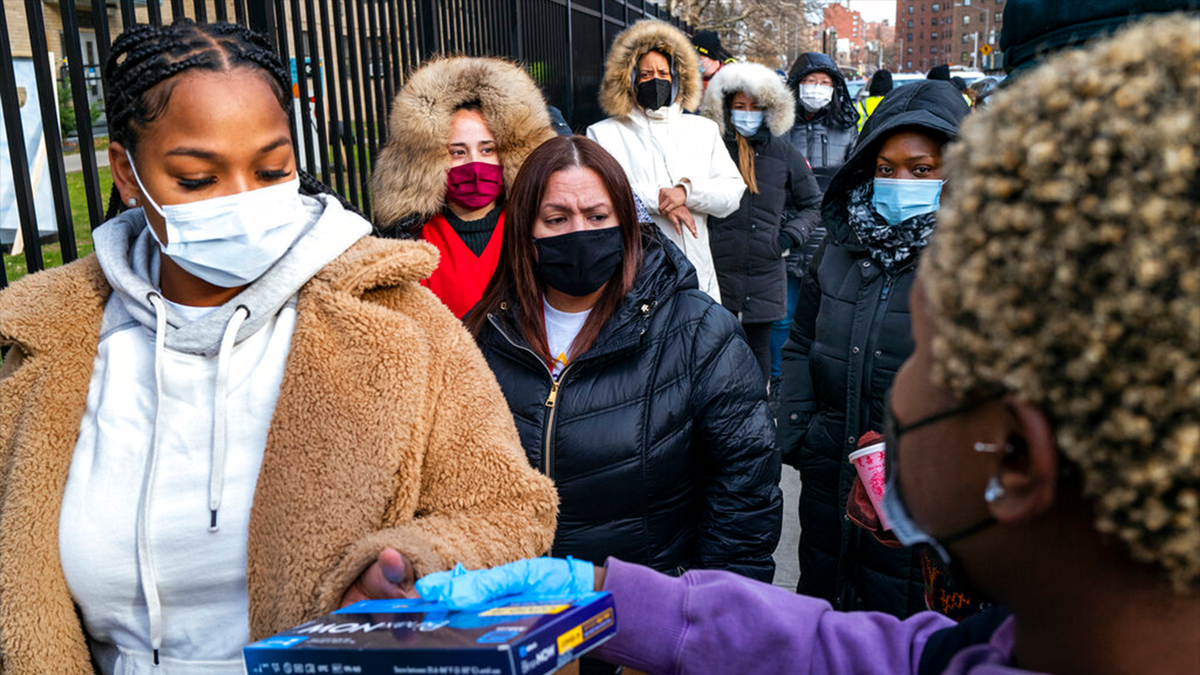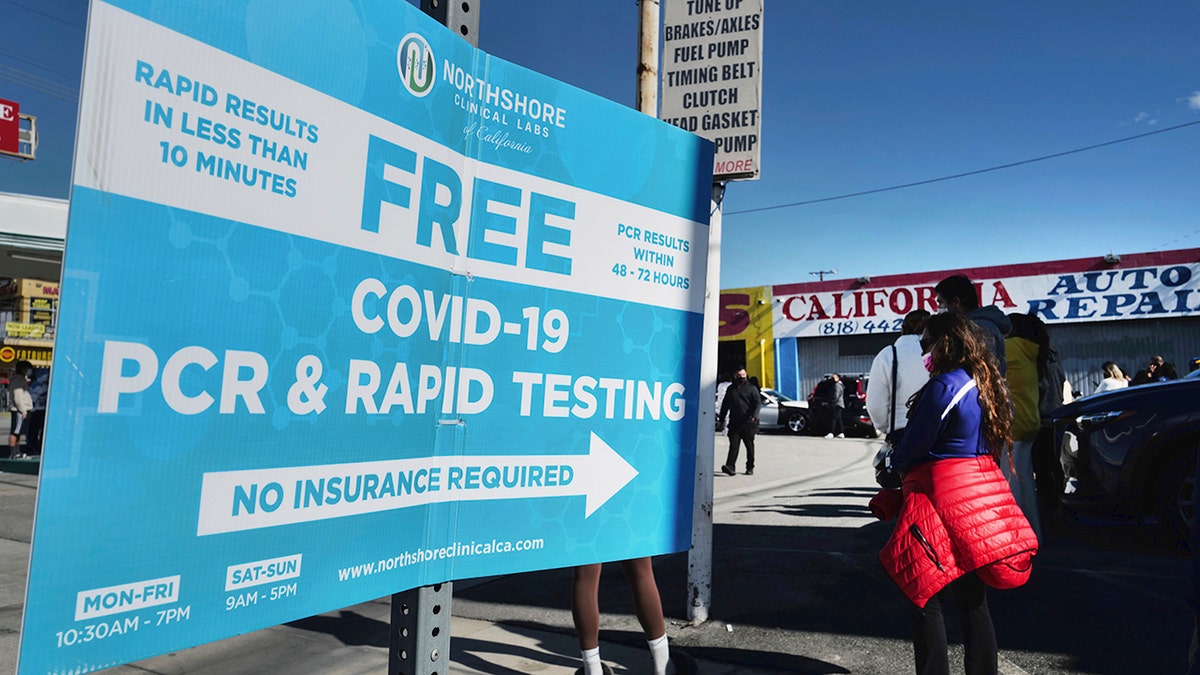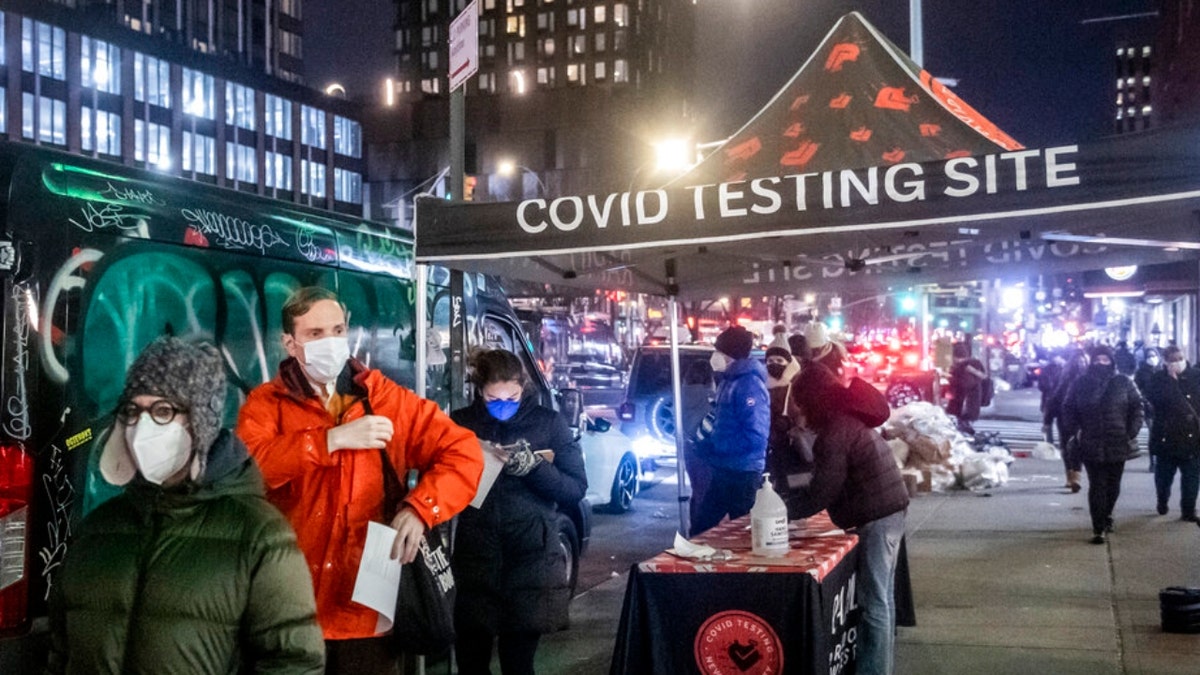Biden in Delaware as coronavirus infections rise
Fox News correspondent David Spunt reports the latest criticism the president faces in his handling of the ongoing pandemic.
The Biden administration announced a plan last week to purchase 500 million at-home rapid tests for COVID-19 and distribute them for free, but health experts say the number is far below what is needed to address the omicron surge and should have been distributed weeks ago.
Amesh Adalja, senior scholar at the Johns Hopkins Center for Health Security at the Bloomberg School Public Health, said the administration’s failure to roll out kits before the Christmas and New Year’s holidays was an "opportunity lost."

People line up and receive test kits to detect COVID-19 as they are distributed in New York on Dec. 23, 2021. (AP Photo/Craig Ruttle, File)
"Many people probably did something – and you might see some infections from this, or they didn’t enjoy themselves because they were scared," Adalja told Fox News. "The quality of life for people over Christmas was probably diminished if they couldn’t get a test because either they … still went and did their activities and then they’re worried, ‘Did I infect my family members or my friends?’
"Or they just decided to stay home and missed out on it. So, none of those are good scenarios," he said.
President Biden’s plan for test kits comes as new cases of COVID-19 in the U.S. have soared to their highest level on record at over 265,000 per day on average, a surge driven in part by the highly contagious omicron variant. Meanwhile, a nationwide COVID test shortage has resulted in lines backed up miles long in some cases as Americans waited for their preholiday virus checks.
CDC SIGNIFICANTLY REDUCES ESTIMATE OF OMICRON PREVALENCE IN US
New cases per day have more than doubled over the past two weeks, eclipsing the old mark of 250,000, set in mid-January, according to data kept by Johns Hopkins University.
Stanford University professor of medicine Dr. Jay Bhattacharya called the Biden administration’s timing "unfortunate," saying it should have anticipated the "entirely predictable winter wave."
"I think it would have been useful for protecting the vulnerable by giving people a tool to understand if they’re positive and thus pose some risk to older people in their life, especially in times of high community transmission," Bhattacharya told Fox News.
Vanity Fair reported last week that the Biden administration rejected a more robust proposal in October to ramp up testing ahead of Thanksgiving and Christmas
When confronted this week about the report, Biden denied that his administration rejected the plan.
Bhattacharya said the 500 million figure is still far too low even if confined to America’s working population.
"I think the more appropriate use of (tests) is you check before you go visit grandma, you check before you go to a big party," Bhattacharya said. "It’s harder to gauge exactly how many but, you know, easily I can imagine each 200 million needing at least one test a week."
COVID-19 OMICRON VARIANT BRINGS GLOOM INTO THE NEW YEAR
At a Wednesday press conference, White House Coronavirus Response Coordinator Jeffrey Zients said the first shipment of rapid tests won’t go out for days, if not weeks.
"Companies are already submitting information, and we expect the contract to be completed late next week," he said. "That means the first deliveries for manufacturers will start in January."
"We’re actively working to finalize that distribution mechanism, which includes a website where people will be able to order tests for free. And we’ll share more details in the … days and weeks ahead."

People line up for a free COVID-19 rapid test at a gas station in the Reseda section of Los Angeles on Sunday, Dec. 26, 2021, as California braces for a post-holiday virus surge. (AP Photo/Richard Vogel)
Neil Jay Sehgal, an assistant professor of health policy and management at the University of Maryland School of Public Health, told Fox News he hopes other channels will help compensate for whatever shortfalls are in the Biden administration’s plan.
"The reality is that we’re probably not going to have them in time to mitigate the current surge and at least that," Sehgal said. "If transmission were at October or November levels, would we have enough tests right now? Probably. I think most people would feel comfortable with test availability.
WHO CHIEF WORRIED ABOUT ‘TSUNAMI’ OF OMICRON, DELTA COVID CASES
"The challenge is that we’re heading into an omicron surge, which folks in the public health community had warned … this was a possibility and certainly was on the horizon for many of us, but I don’t think was one that we adequately prepared for."
The fast-spreading mutant version of the virus has cast a pall over Christmas and New Year's, leading to communities to scale back or call off their festivities just weeks after it seemed as if Americans were about to enjoy an almost normal holiday season. Thousands of flights have been canceled amid staffing shortages blamed on the virus.
The threat of omicron and the desire to spend the holidays with friends and loved ones have spurred many Americans to get tested for COVID-19.

People wait on line to get tested for COVID in the Lower East Side on Tuesday, Dec. 21, 2021, in New York. (AP)
The number of Americans now in the hospital with COVID-19 is running at around 60,000, or about half the figure seen in January, the Centers for Disease Control and Prevention reported.
While hospitalizations sometimes lag behind cases, the hospital figures may reflect both the protection conferred by the vaccine and the possibility that omicron is not making people as sick as previous versions.
COVID-19 deaths in the U.S. have climbed over the past two weeks from an average of 1,200 per day to around 1,500.
CLICK HERE TO GET THE FOX NEWS APP
WHO reported that new COVID-19 cases worldwide increased 11% last week from the week before, with nearly 4.99 million recorded Dec. 20-26. But the U.N. health agency also noted a decline in cases in South Africa, which alerted the world to the variant just over a month ago.
Fox News’ Paul Best and The Associated Press contributed to this report.









































